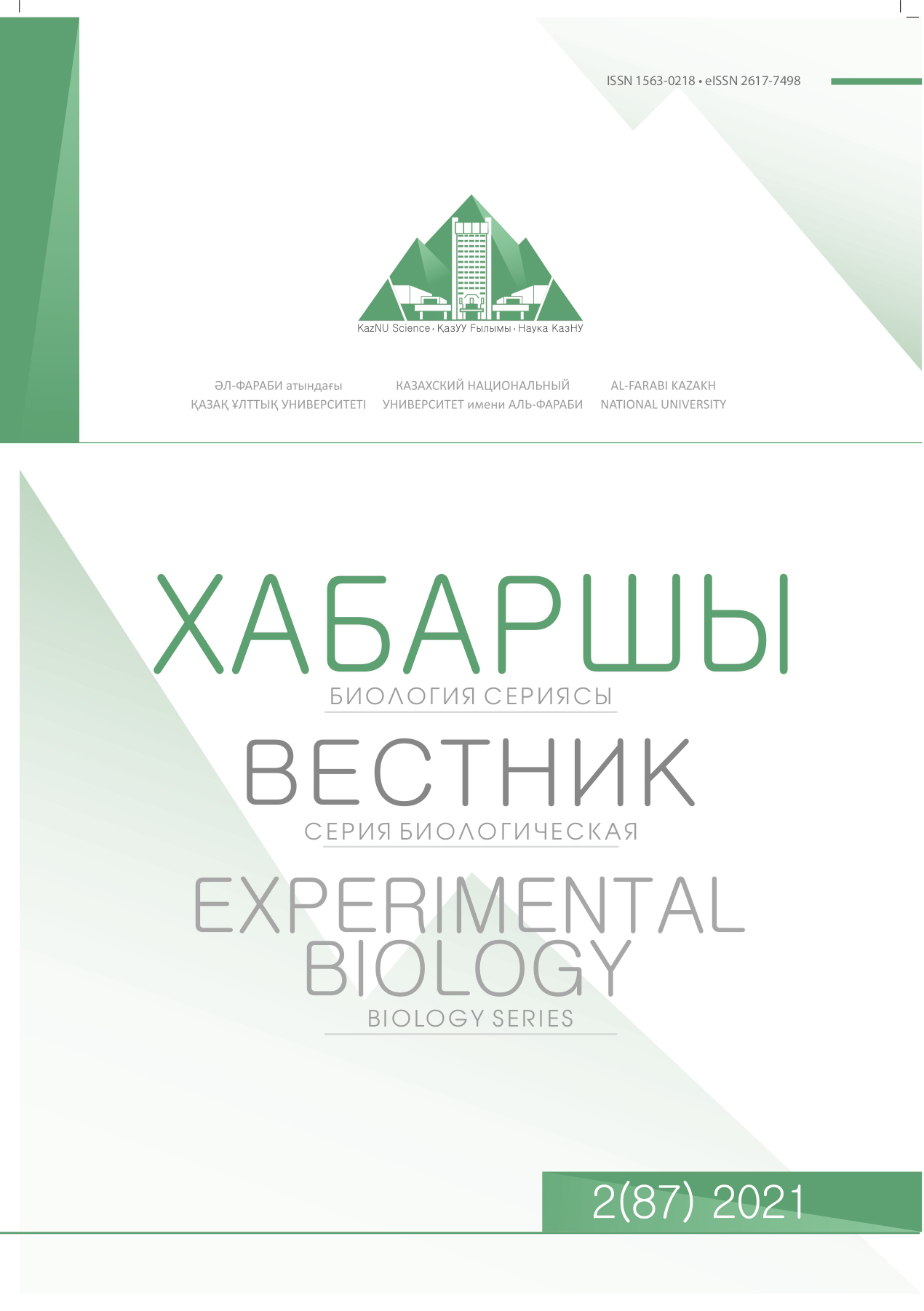ЭВОЛЮЦИЯНЫҢ ШЕШІЛМЕЙТІН ПАРАДОКСТАРЫ - НАТУРФИЛОСОФТЫҢ ЖАН-ЖАҚТЫ КӨЗҚАРАСЫМЕН
DOI:
https://doi.org/10.26577/eb.2021.v87.i2.02Аннотация
Дарвиннің ойлары ғылым үшін көптеген өзекті мәселелерден озғанымен, эволюцияның шынайы механизмі туралы талқылаулар (немесе, мысалы, өтпелі формалардың болмауы), әлі де өзекті болып табылады. Қазіргі кезде Әмбебап ғарыштық ноосфераның өзі кең таралған философиялық тұжырымдамаға жатады. Бүгінгі күні көпшілік оны әртүрлі жолдармен түсіндіреді (атап айтқанда, қолданыстағы түзілімдер сияқты, бірақ бізге әлі толық түсініксіз заңдармен). Тек бір нәрсе анық: бұл заңдылықтар тірі және қарапайым инертті заттар үшін бірдей. Сонымен қатар, соңғы жылдары ғалымдардың көпшілігі біртіндеп тірі тіршілік иелерінің пайда болуы мен прогрессивті дамуы тиісті бағдарлама (жоспар, жоба) болған жағдайда ғана мүмкін деген тұжырымға бет бұра бастады.
Мақала биологияның ең даулы мәселелеріне арналады. Оның ең басты идеясы, эволюцияның жетекші факторларына коллективті ноосфераны жатқызу. Табиғаттағы кез-келген динамикалық ауысулар дәл осылай немесе басқаша түрде олардың «мүдделі» қатысуымен жүзеге асырылады. Яғни, психикалық дененің онтогенезде жинақталған пайдалы эмоционалдық әсерлері берілген нақты түрлердегі мінез-құлық рефлекстерін жетілдіруге ақпараттық негіз болып табылады. Кейбір сирек кездесетін сальтацияларда ғана (мысалы, қабыршақтың қауырсынға айналуы немесе алдыңғы аяқтардың қанаттарға өзгеруі) жоғары әмбебап ақыл-ойдың жетекші рөліне баға беруге болады. Сөз қалдықтық («өлгеннен кейінгі») уни-сфера туралы, терминологиялық тұрғыдан аз қабылданған, философтар үшін «шарден» атауымен белгілі. Оны космоста алып шашыраған биокомпьютер түрінде, қазіргі ЭВМ-мен салыстырғанда баяу қызмет атқаратын, бірақ (өзінің атқарушы тетіктері- вирустар арқылы) қазіргі дүниежүзілік өркениетке үлкен күшпен әсер етуші деп сипаттауға болады.
Библиографиялық сілтемелер
Al'-Farabi: «Estestvennonauchnye traktaty» // Alma-Ata, 1987.
A. R. Uolles: «Darvinizm. Izlozhenie teorii estestvennogo podbora» // Moskva, 1911
A. Vejsman: «Lekcii po evolyucionnoj teorii» // S-Pb., 1918
V.S. Luk'yanec: «Nauka novogo veka: gumanitarnye transformacii» // Kiev, izd. «Parapan», 2008 g.
V.S. Lukianets: "Science of the new century: humanitarian transformations"
V.S. Krisachenko, V.S. Luk'yanec: "Estestvennonauchnoe myshlenie i sovremennost'"// Kiev, izd. «Naukova dumka», 1989 g.
V.S. Krysachenko, V.S. Lukianets: “Natural-science thinking and modernity”
E.E. Ashshurskij: "Virissimologiya" (cikl statej) //zhurnal "Neveroyatnyj mir", № 9 – 12, 1995 g., S-Pb.
E.E. Ashshurskij: «Vsyo novoe nachinaetsya s proekta» //ezhegodnyj al'manah «Sofiya», Kiev, izd. «Feniks», 2005 g.
G. V. CHefranov: «Bog. Vselennaya. CHelovek» //Taganrog, izd. TRTI, 1992 g.
J.– B. de Lamarck: “Philosophie Zoologique” //Paris, p/h “Muséum national d'histoire naturelle”, 1809.
Lev S. Berg: “Nomogenesis, or Evolution determined by law” //Cambridge (USA), p/h “M.I.T. Press”, 1969
L.S. Berg: «Nomogenez, ili evolyuciya na osnove zakonomіrnostej»
E.E. Ashshurskij: «Skvoz' prizmu filosofskogo analiza» //Kiev, izd. «Pam’yatki Ukraїni», 1998 g.
Emir E. Ashursky: "Through the prism of philosophical analysis"
E.E. Ashshurskij: "Opyt filosofskogo osmysleniya protivorechij sovremennoj nauki" // Kiev, izd. «Esperanca», 1994 g.
Emir E. Ashursky: “The experience of philosophical comprehension of the contradictions of modern science"
E.E. Ashshurskij: «Filosofiya v poiskah i nahodkah» //Kiev, izd. «Esperanca», 1997 g.
Emir E. Ashursky: "Philosophy in search and finds"
V.A. Kordyum et al.: «Transfer of genetic information in an organism» // See sci. collection: “Abstracts of I Ukrainian congress for cell biology”, Lviv, April 25-28, 2004
V.A. Kordyum: “Evolyuciya i biosfera” // Kiev, izd. «Naukova dumka», 1982.
V. A. Kordium: «Evolution and biosphere» - Kyiv: p/h «Naukova dumka», 1982
V.A. Kordyum: “Informacionnye potoki v biosfere” //Kiev, izd. «Akademperiodika», 2016.
V. A. Kordium: «Information flows in biosphere» - Kyiv, p/h «Academperiodika», 2016
P. Courtois: "On time and space decomposition of complex structures" - New York, journal “Communications of the ACM”, vol. 28(6), 1985
Grady Booch: "Object-oriented Analysis" – Boston /USA/, publishing company “Addison Wesley”, 2007
A.M.Ugolev: "Estestvennye tekhnologii biologicheskih sistem"// Leningrad, izd. «Nauka», 1987 g.
V. T. Ivashkin, G. A. Minasyan, A. M. Ugolev: "Teoriya funkcional'nyh blokov"// Leningrad, izd. «Nauka», 1990
David G. Green: "Connectivity and complexity in ecological systems" – Melbourne /Australia/, journal “Pacific Conservation Biology”, vol. 1(3), 1994
Eric Chaisson: “Cosmic evolution: the rise of complexity in nature” - Harvard Univ. /USA/, p/h “Press”, 2001.
Eric Chaisson: "Rhythm of the cosmos: finding unity among the natural sciences" – Medford /USA/, journal “Tufts Magazine”, Spring, 2001.
Reisman K. David (editor): “Before and after Avicenna” - Princeton Univ., New Jersey /USA/, 2001
N.A. Nazarbaev: “My oficial'no priznaem Islam i gordimsya etim faktom!” (videointerv'yu) // Dostup po el. resursu: https://www.youtube.com/watch?v=J20GOJQDSQQ
Karl Sagan: “Evolyuciya Vselennoj, zhizni i civilizacii” // S-Pb., izd. «Amfora», 2005 g.












